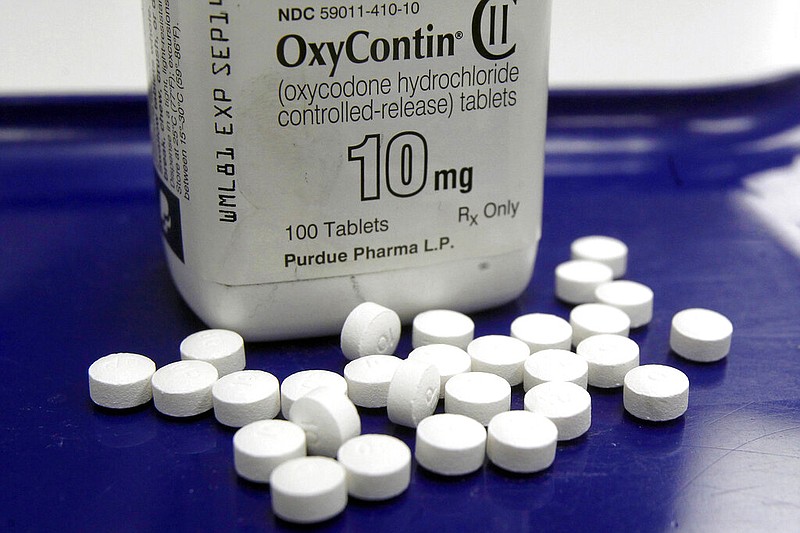A federal bankruptcy judge on Wednesday gave conditional approval to a sweeping, potentially $10 billion plan submitted by OxyContin maker Purdue Pharma to settle a mountain of lawsuits over its role in the opioid crisis that has killed a half-million Americans over the past two decades.
Under the settlement reached with creditors including individual victims and thousands of state and local governments, the Sackler family will give up ownership of the company and contribute $4.5 billion but will be freed from any future lawsuits over opioids.
The drugmaker will be reorganized into a new company with a board appointed by public officials and will funnel its profits into government-led efforts to prevent and treat opioid addiction.
Also, the settlement sets up a compensation fund that will pay some victims of drug addiction an expected $3,500 to $48,000 each.
U.S. Bankruptcy Judge Robert Drain said Wednesday after speaking from the bench for more than six hours that he would approve the plan as long as two technical changes were made. If so, he said, he will formally enter the decision today.
He said before his ruling that while he does not have "fondness for the Sacklers or sympathy for them," collecting money from them through litigation would be complicated.
The settlement comes nearly two years after the Stamford, Conn.-based company filed for bankruptcy under the weight of some 3,000 lawsuits from states, local governments, American Indian tribes, hospitals, unions and other entities. They accuse Purdue Pharma of fueling the crisis by aggressively pushing sales of its best-selling prescription painkiller.
The Sacklers were not given immunity from criminal charges, though there have been no indications they will face any.
State and local governments came to support the plan overwhelmingly, though many did so grudgingly, as did groups representing those harmed by prescription opioids.
Nine states, Washington, D.C., Seattle and the U.S. bankruptcy trustee, which seeks to protect the nation's bankruptcy system, opposed the settlement, largely because of the protections granted to the Sackler family. At least some of them are expected to appeal.
Washington state Attorney General Bob Ferguson quickly announced he would appeal the plan, calling it inadequate.
The bankruptcy judge, based in White Plains, N.Y., had urged the holdouts to negotiate an agreement, warning that drawn-out litigation would delay getting settlement money to victims and the programs needed to address the epidemic.
"Bitterness over the outcome of this case is completely understandable," Drain said. "But one also has to look at the process and the issues and risks and rewards and alternatives of continued litigation versus the settlement laid out in the plan."
Most states have sued Purdue, claiming it aggressively marketed OxyContin, contributing to an opioid overdose and addiction epidemic that has been linked to more than 500,000 deaths in the U.S.
Opioid-linked deaths in the U.S. continued at a record pace last year, hitting 70,000.
SACKLER FAMILY
The crisis crushed the reputation of the Sackler family, major philanthropists whose name was once emblazoned on the walls of museums and universities around the world. With the settlement, family members who have owned the company will still be worth billions.
Whether the deal provides enough accountability for the Sacklers was the most contentious question through the proceedings. Many state attorneys general and advocacy groups working on behalf of opioid victims pushed for the family members to pay more and initially fought against the liability waiver.
They succeeded in increasing the amount the Sacklers would pay from a likely $3 billion to a guaranteed $4.5 billion over a decade.
David Sackler, a former Purdue board member, had testified that family members would not accept the agreement unless it protected them from lawsuits.
Otherwise, he said, the family would defend itself in litigation that could drag on for years, with the company's and the family's assets eaten up by lawyers' fees rather than used to help address the crisis.
His father, Richard Sackler, a former Purdue president and board chairman, said under questioning that he, his family and the company did not bear responsibility for the opioid crisis.
NO APOLOGY
Drain noted that none of the four Sacklers who testified offered an explicit apology. "A forced apology is not really an apology, so we will have to live without one," he said.
One projection commissioned by a group of state attorneys general found that the family's wealth could rise from the current estimate of $10.7 billion to more than $14 billion by 2030 despite making payments under the settlement. That's because the family could continue to benefit from investment returns and interest payments as they make their gradual contributions under the deal.
However, lawyers for Purdue and branches of the Sackler family disputed the assumptions used in the projection.
Several attorneys general won another provision that will create a huge public repository of company documents, including communications with lawyers that normally would be protected by attorney-client privilege.
Purdue has said the settlement overall will be worth about $10 billion, a figure that includes the value of addiction treatment and overdose antidote drugs it is developing.

